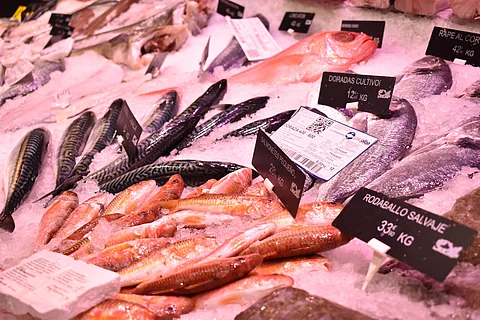

Fishmonger counter in Spain including farmed sea bream of Spanish origin, with all the information available to the consumer.
Photo: Fedepesca.
The Spanish fishmonger's business association, Fedepesca (National Federation of Provincial Associations of Retail Entrepreneurs of Fish and Frozen Products), has taken a fundamental step in its objective of boosting the commercialization of aquaculture products in the Spanish market by presenting the study 'Cultivating the Future of the Sea: A Guide to Sustainable Aquaculture from Production to Consumption'.
The study has been prepared within the framework of the 'Fishmongers 4 Blue Aquaculture Growth' (F4BAC) project, led by Fedepesca, whose main objective is to encourage and promote sustainable activities in aquaculture.
Specifically, the F4BAC project seeks, as mentioned, to promote the marketing of aquaculture products, thus contributing to food security in Spain and, therefore, in the European Union by improving the knowledge and awareness of key actors. Thus, in order to reach society as a whole, the project considers the retail sector of fishery products, i.e., fishmongers, as a key player in this awareness-raising.
With a direct and trusting relationship with the consumer, traditional fishmongers are a fundamental link in transmitting clear, rigorous, and updated information on products of aquaculture origin. Their role, says the study, is key "to combat myths and prejudices that still persist, such as the false belief that these products are less healthy, less sustainable or of lower organoleptic and nutritional quality than those obtained by extractive fishing."
For this purpose, and after a previous analysis through focus groups, the study has taken into account the perception that seafood retailers have about aquaculture. This part of the work has identified both barriers and training needs, as well as opportunities to improve the marketing of aquaculture products in the Spanish specialized seafood trade, and to move towards a greater involvement of the sector in the dissemination of its benefits in terms of sustainability, quality, and trust.
Thus, F4BAC's study on sustainable aquaculture includes a detailed characterization of the seafood farming sector in Spain - for years the leading aquaculture producer in the European Union in volume, concentrating approximately 24.6% of all EU production - including the main species farmed and marketed, their production methods, their environmental impact, and their nutritional value.
For example, one of the most outstanding blocks is the preparation of technical sheets by species, in which the importance of each species in the Spanish national context is analyzed, as well as its advantages from the point of view of sustainability, animal welfare, and public health.
In addition, 'Cultivating the Future of the Sea: A Guide to Sustainable Aquaculture from Production to Consumption' explores the challenges facing the sector, such as diversification, improving consumer perception, or the need to strengthen the role of the specialized retail trade.
The document, which Fedepesca says is "a comprehensive analysis of the role of aquaculture in the current context, addressing its potential as a tool to move towards more sustainable, healthy and responsible food systems," also addresses future trends in the sector.
According to the study, the future of aquaculture in Spain points towards the integration of new technologies, such as artificial intelligence, remote sensors, digital traceability, and biotechnology. Opportunities are also opening up in new species, multi-trophic aquaculture, seaweed production, and ornamental aquaculture.
The 'Fishmongers 4 Blue Aquaculture Growth' project study claims that these innovations, together with the integration of renewable energies and the circular economy, will allow diversifying products, improving efficiency, and responding better to the demands of the Spanish consumer.
"In summary, the future of aquaculture in Spain will be determined by its ability to respond to structural, regulatory, environmental and social challenges innovatively and sustainably, taking advantage of its diversity and productive potential, consolidating its role in food security and strengthening its legitimacy in the eyes of society," the F4BAC study states.
"Spain, as a leader in the EU, can position itself globally if it manages to balance growth, sustainability, and innovation, and if it connects better with the end consumer," it concludes. Fedepesca bets on the fishmongers to carry out this last task.
